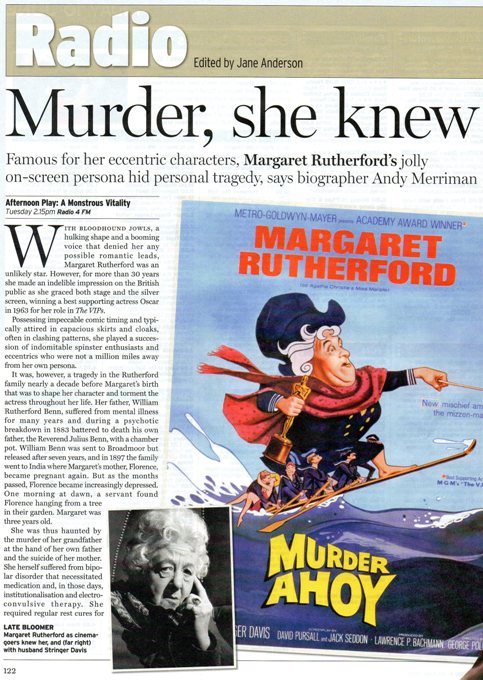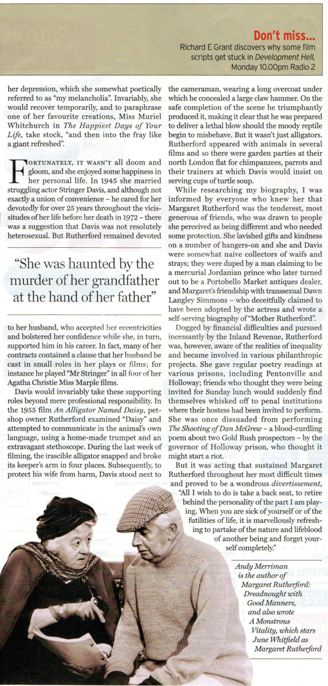Home Page / Books Home Page / Obituary (Margaret Rutherford)
Radio Review of 'A Monstrous Vitality'


Homespun Mystery
Miss Marple's final case: real-life crime mystery of late Oscar-winning actor
Alan Travis - The Guardian, Tuesday 30 September 2008
She was an Academy Award-winning character actor best known in later life for her flamboyant screen portrayal of Agatha Christie's Miss Marple. But after her death, Dame Margaret Rutherford became the victim of a crime mystery worthy of the spinster detective herself. The case involved Rutherford's live-in companion, the disappearance of an Oscar, and a Fulham antiques dealer.
Rutherford, who played Miss Marple in four films between 1961 and 1964, appearing alongside her real-life husband, Stringer Davis, employed a down on her luck former soprano as a companion in her declining years. Violet Lang-Davis lived at the couple's home in Chalfont St Peter, Buckinghamshire, before Rutherford died in 1972. Lang-Davis, then in her 60s, stayed on to look after Rutherford's widower and grew so close to him that they contemplated marriage. But he died in August 1973 before they could tie the knot.
He left a will which bequeathed everything to his wife, even though she was dead. All the silver, china and furniture the grande dame of the English stage and screen had accumulated in her career was due to pass to Stringer Davis's distant cousin William James Davis. Lang-Davis was left nothing. As Detective Sergeant Paul Hunter of the Gerrards Cross police told the director of public prosecutions: "She then embarked on a series of actions designed to secure the inheritance of the late Mr Davis," according to a Whitehall file released this month at the National Archives. She went to see her old priest in Brook Green, west London, Father Joseph Williams, who had agreed to marry her and Davis. She left a copy of a will naming herself as sole beneficiary while Williams was out visiting parishioners. An accompanying note asked him to act as an executor and to forward it to the Rutherford family solicitors. At the same time she set about selling off the actor's possessions, including the Oscar and Golden Globe she won in 1964 as best supporting actress in The VIPs, a star vehicle for Richard Burton and Elizabeth Taylor. Lang-Davis approached a Fulham antiques dealer, John Harvey, telling him she was Rutherford's niece, and he paid her £1,013 in a mixture of cash and cheques for the valuables.
As befitted a dame of the British empire, the collection included dinner services by Copeland, Doulton and Minton, two matching pairs of solid silver candlesticks, a Meissen vase, a solid silver canteen of cutlery and a bottle of Courvoisier. Harvey sold everything except the Oscar (which he paid £30 for) and the Golden Globe, which he kept. "I was desperate for money so I sold the Oscar and the Globe and one or two other items to Mr Harvey," Lang-Davis told Hunter, according to the newly released DPP file. "I was worrying about the items I had sold Mr Harvey. I decided to telephone the police and pretend there had been a burglary and some of the items had been stolen in the burglary." In June 1974 Hunter launched a burglary investigation, but when his inquiries reached the Fulham antiques shop, Harvey told him about Lang-Davis. At first she tried to claim the antiques dealer had stolen the Oscar and Globe from her but under questioning admitted what she had done: "I sold all these things because I needed the money. I needed the money desperately in order to live." A handwriting expert proved the will a forgery.
In October 1975 Lang-Davis, then aged 63, was arrested and remanded in Holloway pending her trial at Reading crown court on charges of theft, criminal deception and forgery. But when the day of the trial arrived she did not appear, and a warrant for her arrest was issued but never executed. The file does not explain this mystery, except to say that by this time Hunter had been seconded to Hong Kong, but it does contain one final twist. In 1985 two of Rutherford's medals - her DBE and a Variety Club award - turned up for sale at Sotheby's. Hunter, back in Britain, impounded them. He knew Lang-Davis had not reported them stolen in the "burglary" and believed they were the first items she sold. He tried unsuccessfully to trace her. As a prosecutor in the DPP's office noted in 1985: "Lang-Davis, it would appear, never stood trial and is still at large."
Major Benjy by Guy Fraser-Sampson
From Guy Fraser-Sampson's personal blog: Saturday, August 30th, 2008
I have heard writers say many times that their motivation for writing a novel is difficult to explain. If so, how much more so when you are actually writing a novel in somebody else’s style and using their characters? For me with Major Benjy I think the reasons were partly general and partly specific. The general ones were admiration for the writer and a desire that the world should have another “Mapp and Lucia” book to enjoy. Specifically, I wanted to fill in a key gap in the narrative (including the total disappearance without trace of one particular character) and flesh out the supporting cast (an acknowledged issue with Benson’s writing). It’s not for me to say how well I might have succeeded, but thankfully the reviews to date have been very kind. It is probably worth mentioning a few words about the copyright situation, since I know others may be considering writing sequels to well known books or series. The rule in the UK at the moment is that copyright runs for 70 years from the end of the year of death; thus Benson, who died in 1940, goes out of copyright in the UK at the end of 2010. Not in the US, though, since they have a different rule which operates for 95 years from the date of publication of the work, and there is currently much discussion about the US rules being adopted in Europe (but no word on what might happen to books which would fall into a hole (i.e. would have gone out of copyright and then would apparently go back into it) if that were done. This is an important point since I know many enthusiasts like to write fan fiction and post it on the net. This is actually in breach of copyright and you are putting yourself at risk should the relevant estate choose to do anything about it. For my part, though my written agreement covers only Major Benjy, there is a gentleman’s agreement with the estate that I will also be writing two more: Lucia on Holiday and Au Reservoir. However that can only happen if Major Benjy is a success. Nobody (not even Picnic!) is going to publish a book which is unlikely to be commercially successful, so please run out on 1 September and order it (preferably supporting your local bookshop in the process).
Friday, August 29th, 2008
E.F. Benson died in Rye, which he had made his home for the last twenty years, in 1940, having written over one hundred books: a diverse mix of history, biography, fiction, plays, and books on ice skating, of which sport he was a pioneer. The vast majority of these books are today known to us only by their titles, and that is probably no bad thing since their quality is very patchy. There is growing recognition though, that the best of them, of which the Mapp and Lucia series would probably be the best known examples, are very good indeed. So good, indeed, that a major re-appraisal of Benson’s stature as a writer is probably long overdue. Benson was both well-known and well-connected during his lifetime, numbering Conan Doyle, H.G. Wells, Henry James and Queen Mary (wife of King George V) amongst his acquaintances. He was widely read by the likes of W.H. Auden, Noel Coward, Nancy Mitford and Evelyn Waugh; I personally believe that Major Benjy, whom we first encounter in Miss Mapp, coloured the character of Apthorpe in the latter’s Sword of Honour trilogy. In other words, his influence as a writer was much more widespread and important than many might today suspect, particularly since he also found time amongst his hectic writing schedule to be a very active reviewer of other people’s books. His ghost stories are said by those who know about such things to stand comparison with Dickens and M.R. James. Some of his novels such as Paying Guests and Secret Lives have survived in print on a stand-alone basis, while The Blotting Book is an excellent courtroom drama. It is the Mapp and Lucia series, however, by which he is inevitably best-remembered. There is a great deal of evidence that he originally conceived both Queen Lucia (1920) and Miss Mapp (1922) as one-off books. He revived Lucia for Lucia in London in 1927, but it was not until 1930 that he had the stroke of genius for which we will all ever be grateful and brought these two hilariously dreadful creations together in Mapp and Lucia, following that with two more books, Lucia’s Progress and Trouble for Lucia, the latter being published just a few months before his death.
The central theme of these last three books (the true Mapp and Lucia series) is a battle for social supremacy in the fictional town of Tilling, which was in fact the Rye Old Town which Benson knew in real life. No deception is too devious, no lie too monstrous, no stratagem too outrageous in this ongoing duel. A glorious supporting cast includes the effeminate Georgie, a compulsive embroiderer and doily maker, the rumbustious, bibulous Major Benjy, the unconventional artist Quaint Irene, a vicar from Birmingham who speaks determinedly with a Scottish accent, and Susan Wyse MBE, who wears furs on even the hottest of days and negligently leaves her medal in full view whenever friends come to visit. Part of the reason for Benson’s reappraisal is being driven by gay fiction courses in the States. There is no doubt that he was gay, living openly with different men at various times and in the early books both Georgie and Quaint Irene are clearly signposted as gay characters, but these references are dropped abruptly in the later books – was he warned off by a friendly word of advice, and, if so, by whom? Such studies are probably unhelpful. Nowhere does Benson’s fiction depend on any gay plot device, and in any event Georgie is camp rather than gay, while Irene is also hinted to take a healthy interest in male anatomy. The true scale of his achievement, however, lies in the simple fact that his books have endured for the continued pleasure of a consistently loyal fan base in a way in which no others have, apart of course from the Jeeves and Wooster stories, and here there are clear parallels, with their highly stylised characters, and high drama woven from what are actually fairly mundane happenings, albeit of highly charged social importance. None of his contemporaries writing supposedly humorous fiction have survived to anything like the same extent, no matter how wildly popular they were at the time; Dornford Yates would be a perfect example. So, if you have not been fortunate enough so far to have been introduced to these wonderful books, please go out there and get reading. In my next post, I will be talking about my own modest contribution to the canon.
Wednesday, August 27th, 2008
In the first of my blog entries here on the Picnic authors’ site I really should start with a huge apology, since by some unaccountable oversight I am not actually a Picnic author at all, at least not yet. My new “Mapp and Lucia” book, Major Benjy, is in fact published by Troubadour in Leicester (already out in the US, out in the UK on 1 September). However, the good Major has sent Picnic a very sweet letter acknowledging that this was not the conduct to be expected of an officer and a gentleman and that he will try to do better in future. I have a theory that all good writers (and I know that Picnic only take on good writers!) start off as good readers. After all, what greater motivation can there be for wanting to write a book than an existing love of the things, usually coupled with cardboard boxes scattered around various locations full of old friends from which we really cannot bear to be parted, because to take a few to the charity shop, as our partners frequently urge us to do, would feel uncomfortably like boiling a beloved golden retriever down for glue. This was certainly true in my case. I was fortunate enough to grow up in a house without TV and therefore would begin reading a book when I woke up in the morning, and would continue until it was time to go to bed. Even there, the story did not end, because I used to take a transistor radio to bed with me, hide under the bedclothes with it turned down as low as possible, and listen to “A Book at Bedtime” on Radio 4. It was in exactly this way that, at the age of ten, I first made the acquaintance of the redoubtable Mrs Philip Lucas (as she then was) when I experienced Queen Lucia. Even though I now think (as probably most Benson fans do) that this is probably the weakest of the “Mapp and Lucia” books, I was captivated and resolved to get them out of the library one by one. There was a slight problem here in that they were in the senior library whereas I only had a ticket for the junior library next door, but my mother rose to the challenge and insisted that I should be issued with a full ticket six years early with the simple but effective argument that I had in any event already read everything in the children’s library at least once. The books have been firm favourites since then (there are also two sequels by Tom Holt which are now sadly out of print, as seems to have become a badge of honour for good writers), and they are looking at me now as I write this from the couple of shelves I keep for books which I re-read over and over again (The Alexandria Quartet is also there, but I will leave you guessing about the others – a man must have some secrets).
For those poor few unfortunates who have not previously encountered the “Mapp and Lucia” stories, take heart! You still have the pleasure of reading them for the first time (there are six by Benson, the first couple of which you could safely ignore and come back to later, plus two by Tom Holt and now Major Benjy by yours truly)! Briefly, they tell the tale of two absolutely frightful ladies who end up inhabiting the same genteel seaside town, which Benson calls Tilling, but is actually Rye where he lived in Lamb House, as he has both Mapp and Lucia do in turn (though in the books it is called Mallards), and where he was twice Mayor, as he has Lucia be. Neither can bear to be anything other than the acknowledged number one in any matter affecting Tilling, but of course there can be only one absolute ruler, and so the books may be compared to two prima donnas in constant search of the same role. The stratagems, untruths, and downright deception that attend these efforts have ensured that the books have endured as acknowledged comic masterpieces in a way which is rivalled only by Jeeves and Wooster. Later in the week, I am planning to tell you more about Benson the writer, and attempt to place him in context. Then I will write specifically about Major Benjy and what I was trying to achieve when I wrote it. But now, dear ones, I shall collapse positively drained by the effort of it all, and retire with a nice cup of Earl Grey.
Read the Amazon Reviews for Major Benjy | Lucia on Holiday | Au Reservoir | - My reviews (not on Amazon) here
Back to Top / Back to Books Home Page / Back to Home Page
Page refreshed : 20th October 2020 (G)
